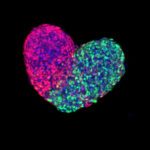Lien vers Pubmed [PMID] – 31689434
Lien DOI – S0022-2836(19)30613-810.1016/j.jmb.2019.10.017
J Mol Biol 2020 02; 432(3): 712-723
We revisit the notion of gene regulatory code in embryonic development in the light of recent findings about genome spatial organization. By analogy with the genetic code, we posit that the concept of code can only be used if the corresponding adaptor can clearly be identified. An adaptor is here defined as an intermediary physical entity mediating the correspondence between codewords and objects in a gratuitous and evolvable way. In the context of the gene regulatory code, the encoded objects are the gene expression levels, while the concentrations of specific transcription factors in the cell nucleus provide the codewords. The notion of code is meaningful in the absence of direct physicochemical relationships between the objects and the codewords, when the mediation by an adaptor is required. We propose that a plausible adaptor for this code is the gene domain, that is, the genome segment delimited by topological insulators and comprising the gene and its enhancer regulatory sequences. We review recent evidences, based on genome-wide chromosome conformation capture experiments, showing that preferential contact domains found in metazoan genomes are the physical traces of gene domains. Accordingly, genome 3D folding plays a direct role in shaping the developmental gene regulatory code.
